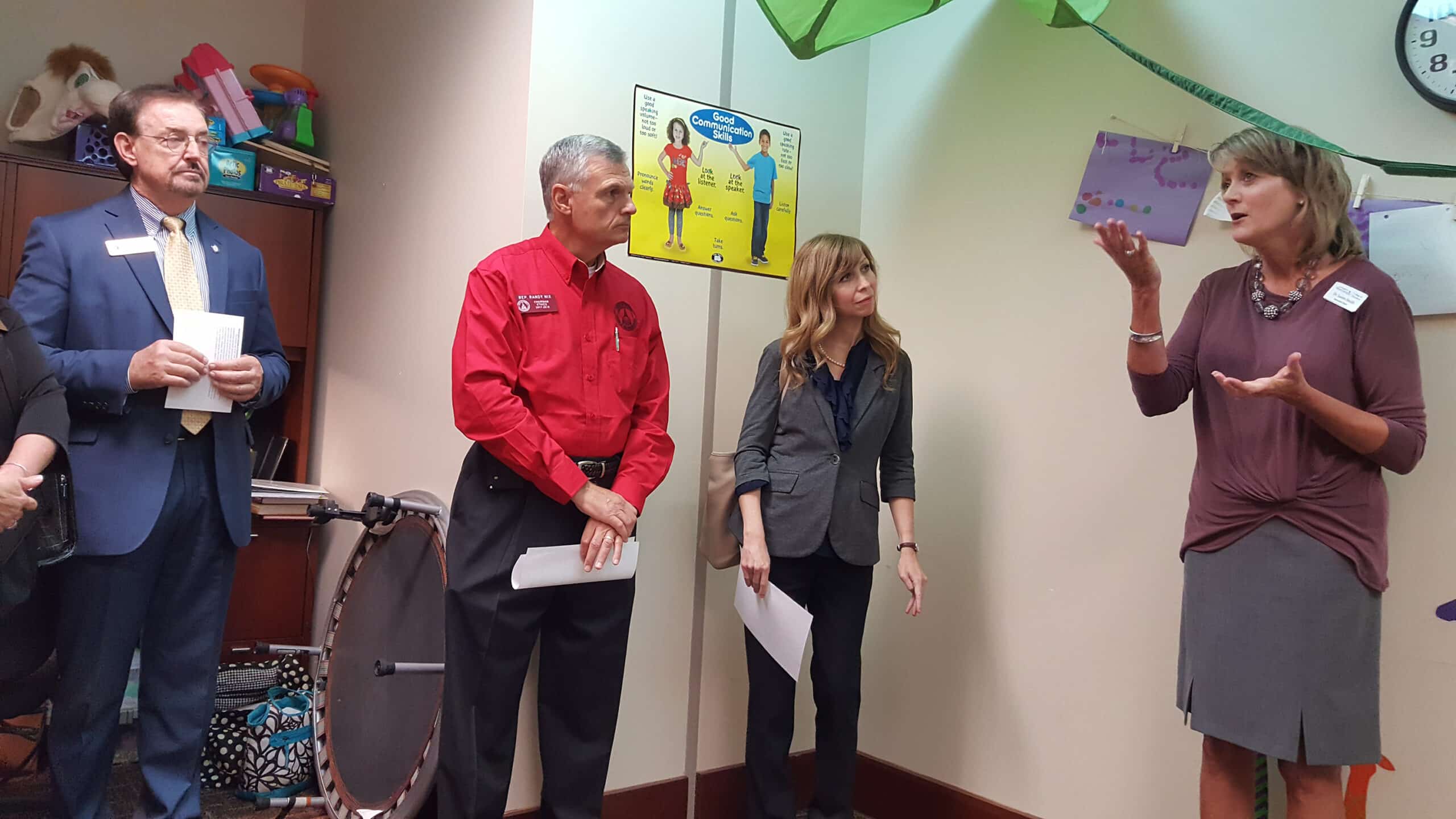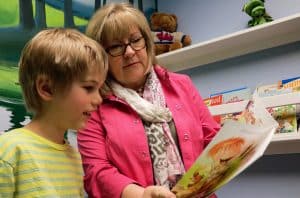A Win-Win-Win-Win for West Georgia

“When children don’t have language, their behavior becomes their language,” said Judge Peggy Walker of the Douglas County Juvenile Court.
When children use their behavior to communicate, they often end up being disciplined and excluded. They may be dismissed from an early learning program, suspended in grade school, or even engaged in the juvenile or criminal courts. Walker experiences this firsthand in her courtroom.
Last year, more than 15,000 Georgia students in kindergarten through third grade were assigned out-of-school suspension (OSS), likely due to disruptive behavior. Almost 2,800 were at home for five or more days.
Four out of five children ages 5 to 13 with emotional and behavioral disorders have a language impairment that escapes the attention of adults. Youth involved in the juvenile justice system are up to five times more likely than non-offending peers to have language deficits.
Three years ago, a unique collaboration formed in west Georgia to ensure that children with language impairments are identified early and receive the support they need to address developmental delays so they can succeed in school and life.
Thanks to funding from the Alice Huffard Richards Foundation, the University of West Georgia (UWG) and West Georgia Technical College (WGTC) are providing children and families with speech therapy using a model that’s a “win-win-win-win” for the area, according to G.W. Rogers, the head of campus operations on WGTC’s Thomas Murphy Campus in Waco, who helped secure clinic space on campus.
A win for the kids
At the Murphy Campus speech clinic, children ages 0 – 4 can access services free of charge. K-12 students are served for a reasonable fee—with scholarships available for all who need them—at the UWG Comprehensive Community Clinic. These early intervention services allow children to get the treatment they need to understand, process, and use words to communicate their ideas and emotions.
A win for the parents
In addition to accessing affordable services in convenient locations, parents are learning strategies that can support their children’s continued development in between therapy sessions. The clinics are located on college campuses, which have inspired some parents to enroll in courses that can open doors to better employment opportunities.
A win for the colleges
Graduate students earn course credits while gaining real-world professional experience along with coaching from licensed speech-language pathologists. Students go on to work in the local school systems and medical facilities. Innovative therapy models prepare graduate students for all avenues of speech-language therapy, such as a parent-child interactive therapy model to help caregivers communicate better with children.
A win for the communities
The communities in the region now have access to speech-language services, increasing children’s ability to succeed in school and become part of the future workforce.
“It seems like a small thing,” said Rogers. “All I did was provide an office that wasn’t really being used. But this has become the highlight of my 14 years at WGTC. So many people are involved, and none of them are worried about taking credit. That’s what makes it work. It’s all about what’s best for the kids.”
The Comprehensive Community Clinic began as a small program in the early 1980s and lives up to its name, providing speech-language therapy services as well as tutoring in math, reading, and counseling services. Leaders continue to look for opportunities to reach out to the surrounding area.
“That’s the community service program’s mission,” said Laura Smith, associate dean of the UWG College of Education. “We want to prepare our students, and we’re constantly looking for ways to take our services into rural areas so people have easier access.”
The university and technical colleges in west Georgia work closely with area school systems and Babies Can’t Wait, Georgia’s early intervention program for infants and toddlers with developmental delays and disabilities and their families. These partners refer families to the speech clinics.
This partnership and approach is designed specifically for west Georgia, but it could be applied in other areas of the state that are home to colleges and universities with graduate level speech-language pathology programs, including Athens, Atlanta, Savannah, and Valdosta. Valdosta State University already operates a speech clinic on campus, but doesn’t yet have sites in the broader community.
This west Georgia partnership is part of the Education Collaborative, a region-wide collective effort that seeks to support children from birth through high-school graduation so they are prepared to enroll in college, enlist in the military, and join the workforce.

The Collaborative started out with a goal of increasing high-school graduation rates, but partners quickly realized they needed to reach children much earlier on to move the needle on that goal. As a result, teams are focused on supporting children in four developmental themes:
- promoting increased access to high-quality early learning programs to ensure that children are ready to succeed when they arrive in kindergarten;
- measuring foundational learning by students’ ability to read proficiently by the end of third grade and develop foundational math abilities needed to succeed in algebra;
- supporting students’ independence in developing personal plans to guide their choices and preparing them for success in high school; and
- measuring pathways by high-school graduation and students’ preparation for enrolling in college, enlisting in the military, and employment.
The Education Collaborative has attracted diverse partners including UWG, WGTC, area public and private schools, the Carroll County Chamber of Commerce, Community Foundation of West Georgia, Communities in Schools, and others. Together, they seek to dramatically increase third-grade reading proficiency and high-school graduation rates—leading to a big “win” for the region.
“We have a choice,” said Walker. “We can raze our state and our country by putting children out of school because of their behavior. Or we can raise our children up and build up our state and our nation by giving them access and education to overcome the serious stressors in their lives.”
